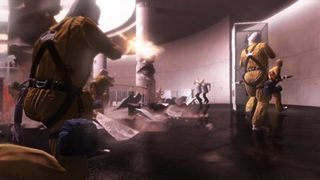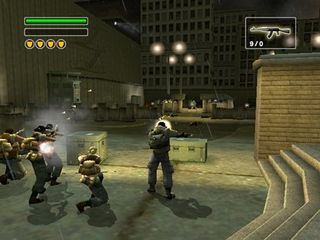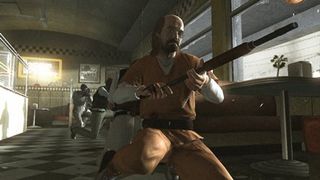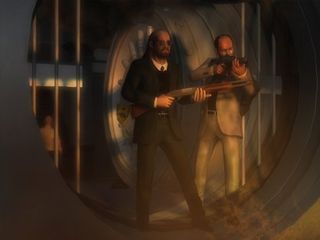Kane & Lynch: How it feels to be critically panned
What's it like when several years of work are met with bad reviews and internet snark?
Wrong. You see, while no-one likes a disappointing game, what may just seem a quick, innocent ALL CAPS forum post is also a savage indictment on several years of blood, sweat, tears and inhumanly late nights in the life of another human being. So we wanted to give the devs a chance to let us know just how a bad review feels. We wanted to humanise the game-making process and show you the flip-side to the fallout of a bad critical reception.
We contacted several companies with our questions, but unfortunately, only one got back to us in time for deadline. But very fortunately, that company is in a prime position to discuss everything that can go wrong. So we now present the candid words of Jens Peter Kurup, Director of Kane & Lynch at IO Interactive. It's a revealing talk, filled with a frank openness we wish we saw more of in the industry.

Above: Things didn't start out as badly for Kane & Lynch as the internet backlash may lead you to believe
GamesRadar: On a personal level, how does it feel to have a game which you’ve put so much time and effort into be critically maligned upon release?
Jens Peter Kurup: I’ve had several sets of emotions in the last year. Just around launch I felt pretty confident and okay. The review scores that we had already seen at IO looked to be a tad lower than expected – some 8/10, some 7/10, but some 5/5’s as well. We also had a good feeling about some of the bigger sites because it seemed that the latest hands-on sessions had gone well, especially with the Fragile Alliance element of the game.
Even though we received nice scores in a lot of the mainstream and lifestyle press, the more specific gaming press started to give it mediocre scores, and we knew that we wouldn’t hit our Metacritic mark. That felt confusing and unfulfilling, but by and large I was still emotionally unaffected by the criticism. I agreed with the existence of most of the game's issues and I knew that it was all something we could deal with professionally when the team took the franchise forward.
Then GameSpot reviewed the game. And they didn’t like it one bit.
Sign up to the GamesRadar+ Newsletter
Weekly digests, tales from the communities you love, and more
I’m not quite sure why, but I remember that review hit the team like a hammer. You can just 'absorb' a bad score but there was something in the tone of that review that was tough on people, and on me.

Above: IO's last squad shooter previous to Kane & Lynch was the excellent Freedom Fighters, so pre-release expectation was high
It’s a review that I would like to forget (like GamesRadar's, by the way) , but unfortunately the GameSpot review had its own wicked little life and Eidos, GameSpot and of course the game got entangled in what I guess is best described as a conspiracy theory. And if there’s anything the 'net loves, it’s a good conspiracy.
It was surreal to sit in Copenhagen and watch the game get shredded in forums for reasons and feelings that didn’t all seem entirely based on the game itself. I know this might sound like a sissy song of “Boo-hoo! This isn’t fair” and other unproductive thoughts, but you asked me how I felt and I did feel like that for a couple of weeks after the GameSpot review. Pathetic I know, but in glimpses I still feel it, because when I meet somebody who hasn’t played the game, I can be fairly sure that his or her opinion is based on the GameSpot review. It just won't go away.
Except for that, I feel fine today, and the franchise is doing well. Sales have been okay, the movie deal is moving along nicely, and most importantly we’ve learned a lot from K&L, and it seems that it’s all being put to use in our future products.

GR: How fair do you feel critic and gamer reactions were to Kane & Lynch? Were there any points you particularly agreed or disagreed with?
JPK: Critic reactions to the game have been harder than the gamer reactions, but in general I’ll call it fair. I do agree on most issues raised on the control scheme. In production the quality went up and down and it required daily maintenance, a sure telltale that some core mechanics need to be changed instead of tweaked. I regret that I wasn’t clear-sighted enough to make the design changes when we had the time.This experience has dramatically changed the way we review code internally. We test the products harder and earlier.
I do however not agree with the critics that simply just didn’t like the characters or the story. They didn’t like the characters as people and had problems relating to them. If you want to mirror your happy face in shining knight's armour then Kane and Lynch 1 isn’t the place to look, and people have every right to dislike that. I just don’t agree. I’m sick of likeable characters. I like Clint Eastwood in Unforgiven. I’m done with Mel Gibson in the Lethal Weapons.

Above: Kane and Lynch themselves. Impossible to like?
That said, I would have liked to introduce a few redeeming moments earlier in the game. In K&L it doesn’t really happen until the last level, which is too late for most people.
I do think we received some unfair flack for a few weeks, and that it did taint the perception of the game somewhat, but that’s just how it is. It’s also a bit painful when a review thinks that a bug is a design decision. I know the player won’t know the difference and that the point is valid, but it still annoys me as a developer, maybe because it’s something that we could have done better.
On a boring number note, the Nielsen agency ran an online survey with some 900 participants or so after the release. The report is fairly critical on some of the same issues like control etc., but it’s worth noticing that the players enjoyed the game more than reviewers did. Of the buyers of the game, 2% did rate it as a poor game, 3% as fair, 25% as good, 44% as very good and 25% as excellent. Players rated it slightly more realistically but still way more positively than the reviews, and also more positively than I perceive the game personally.

Oh, that's why the Stellar Blade devs were terrified by demo players: one fan's spent "about 60 hours" maxing Eve's skill tree before the action RPG is even out

A new Taylor Swift song mentions GTA, but some remember it mentioning Baldur's Gate 3, Final Fantasy 14, and more in hilarious Twitter trend
Most Popular




